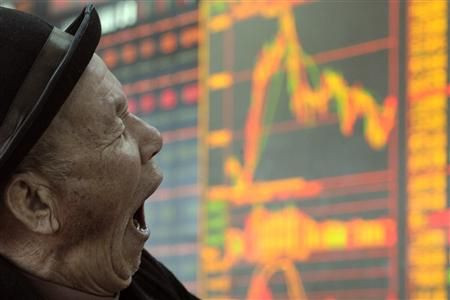Weekly Roundup: Asian Markets Fall Amid Economic Growth Concerns

Most of the Asian markets fell in the week as investor confidence was weighed down by the intensifying tensions between China and Japan, raising concerns of economic slowdown and undermining the stimulus measures announced by the Bank of Japan.
Japan's Nikkei 225 Stock Average fell 0.5 percent and closed at 9110. South Korea's Kospi Index dropped 0.3 percent and closed at 2002.37.
The relationship between China and Japan took a bad turn after Tokyo last week said that it would buy the East China Sea islands claimed by both countries. The purchase of the islands for 2.05 billion yen ($26 million) was approved by Japan's cabinet Sept 11.
Investors were worried that the dispute over these islands, called Senkaku in Japan and Diaoyu in China, could result in a trade fight between the two Asian economic powerhouses. Market players were concerned that the dispute between the world's second and third largest economies could further weaken the global economic growth already affected by the euro zone crisis.
Protesters in China called for boycott of goods from Japan. Japanese companies such as Toyota Motor Corp, Honda Motor Co and Nissan Motor Co. have stopped production at certain plants in China. Japan has asked Beijing to make sure that Japanese businesses are provided the required safety in China.
Investor confidence was lifted after the BoJ announced stimulus measures to bolster the country's economic growth. The BoJ said that it was increasing the size of its asset purchases by 10 trillion yen ($127 billion) to 80 trillion yen. The central bank decided that the increased amount would be used for purchasing the treasury discount bills and Japanese government bonds. Meanwhile, the central bank left the policy interest rate in the current range of zero to 0.1 percent.
Japan reported Thursday a rise in trade deficit in August compared to the previous month with a decrease in both exports and imports. The Finance Ministry data showed that the country recorded 754.1 billion yen ($9.62 billion) trade deficit in August, up from 517.4 billion yen deficit in July.
Exports dropped 5.8 percent to 5.05 trillion yen from a year earlier, indicating the soft global demand. Imports fell 5.4 percent to 5.8 trillion yen, showing the weak domestic demand.
There was a slump of 22.9 percent in exports to the European Union compared to the previous year. While exports to China dropped 9.9 percent, exports to the U.S. rose 10.3 percent. The continuing debt crisis in Europe and the strength of the Japanese yen have hurt the demand for exports, the key driver of Japan's economy.
India's BSE Sensex climbed 1.6 percent and closed at 18752.83. Market confidence was boosted as India’s government last week announced the decision to go ahead with the foreign direct investment in retail, aviation and broadcasting following the widespread criticism against it over policy paralysis. Also, the government announced the decision to hike the diesel prices by 14 percent to reduce the increasing subsidy costs faced by the country.
Hong Kong's Hang Seng Index rose 0.5 percent and closed at 20734.94. China's Shanghai Composite Index fell 4 percent and closed at 2026.69.
The preliminary HSBC Flash Purchasing Managers Index (PMI) released Thursday showed that China's manufacturing activity continued to contract in September. The preliminary reading of the PMI, a measure of the nationwide manufacturing activity, rose to 47.8 in September compared to 47.6 in August. When the PMI is below 50.0, it indicates that the manufacturing economy is declining. There is also a hope that China will soon announce stimulus measures after the HSBC flash manufacturing PMI showed that the country’s economy was not recovering.
Major losers: Shares of Dongfeng Motor Group C plunged 9.9 percent. Shares of Nissan Motor Co declined 5 percent and those of Fast Retailing Co dropped 3.9 percent.
© Copyright IBTimes 2024. All rights reserved.





















